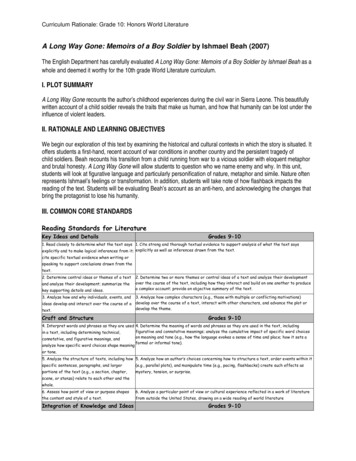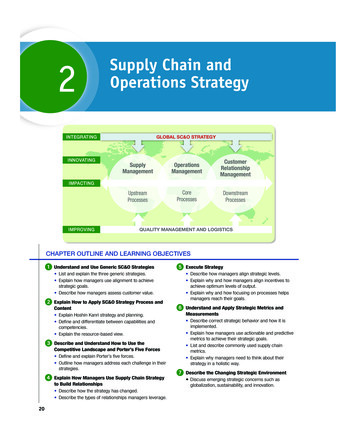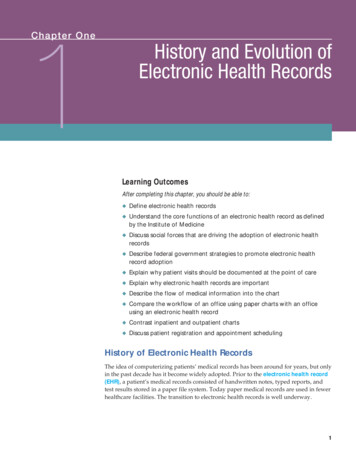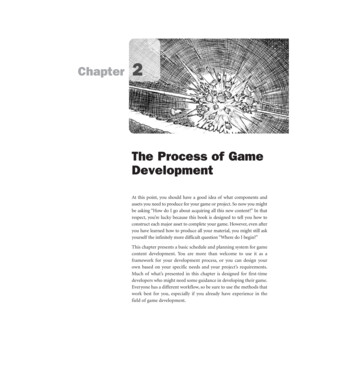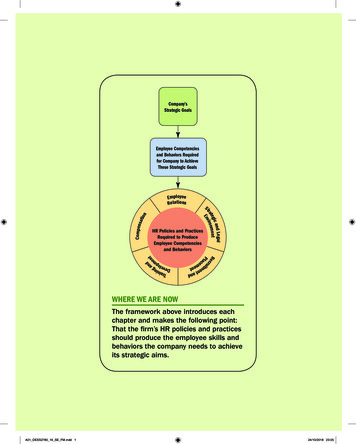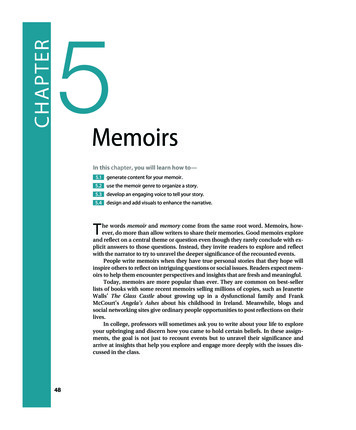
Transcription
chapter5MemoirsIn this chapter, you will learn how to—5.1generate content for your memoir.5.2 use the memoir genre to organize a story.5.3 develop an engaging voice to tell your story.5.4 design and add visuals to enhance the narrative.The words memoir and memory come from the same root word. Memoirs, however, do more than allow writers to share their memories. Good memoirs exploreand reflect on a central theme or question even though they rarely conclude with explicit answers to those questions. Instead, they invite readers to explore and reflectwith the narrator to try to unravel the deeper significance of the recounted events.People write memoirs when they have true personal stories that they hope willinspire others to reflect on intriguing questions or social issues. Readers expect memoirs to help them encounter perspectives and insights that are fresh and meaningful.Today, memoirs are more popular than ever. They are common on best-sellerlists of books with some recent memoirs selling millions of copies, such as JeanetteWalls’ The Glass Castle about growing up in a dysfunctional family and FrankMcCourt’s Angela’s Ashes about his childhood in Ireland. Meanwhile, blogs andsocial networking sites give ordinary people opportunities to post reflections on theirlives.In college, professors will sometimes ask you to write about your life to exploreyour upbringing and discern how you came to hold certain beliefs. In these assignments, the goal is not just to recount events but to unravel their significance andarrive at insights that help you explore and engage more deeply with the issues discussed in the class.48M05 JOHN4654 03 C05 pp048-066.indd 483rd Proof17/11/14 5:06 PM
at–a–glanceAt–A–GlanceMemoirsThis diagram shows a basic organization for a memoir, but other arrangements of thesesections will work, too. You should alter this organization to fit the features of your topic, angle,purpose, readers, and context.Introduction: Sets the sceneDescription of acomplicationEvaluation of thecomplicationResolution of thecomplicationConclusion: What thewriter learnedUsing rich detail, memoirs tell a personal story in which an event or series of eventsleads the writer to new insights about life. They tend to have these main features: An engaging title that hints at the memoir’s overall meaning or “theme.”An introduction with a “lead” that captures the reader’s interest or sets a scene.A complication that must be resolved in some way—a tension or conflict betweenpeople’s values and beliefs, or a personal inner conflict the author faces.A plot that draws the reader forward as the memoir moves through a series ofscenes or stages.Intimacy between the narrator and the reader, allowing the writer to speak withreaders in a personal one-on-one way.Rich and vivid details that give the story greater imagery, texture, and impact.A central theme or question that is rarely announced or answered explicitly, butthat the narrator explores and reflects on with the reader.A new understanding or revelation that presents a moment of growth, transformation, or clarity in the writer.49M05 JOHN4654 03 C05 pp048-066.indd 493rd Proof17/11/14 5:06 PM
50CHAPTER 5 MemoirsOne Student’s WorkVisit MyWritingLab to explore aninteractive version of this essay.MemoirsEngaging title thatforecasts the subjectof swimming andalso hints at thememoir’s theme.Introduction startsfast with a lead thatsets the scene, and itends in a surprisingway.The complication isintroduced, an innerstruggle the narratorfaces.Background movesthe plot forward.Rich and vivid detailsgive the story textureand intensify thecomplication.M05 JOHN4654 03 C05 pp048-066.indd 50Diving InHelen SandersonTake your mark. Anticipation builds as I crouch and grip the edge of therough plastic, ready to strike at any second. I finally hear the sound of the electronic starter just a few nanoseconds earlier than my competition. I hit a block ofice before I dive just below the surface. A few strong kicks and I’m taking my firststroke, and then another as fast as I can. Breathe as little as possible. By the timeI’m on the second lap, I’m going nowhere. I am dying to take in gulps of air andrest for only a moment, but I know I can’t. Surely this is almost over. My lungs andmuscles burn for oxygen as I dig in for the final stretch; the end of the pool couldnot come soon enough. I look up to find that I have shaved a second off of mytime and have achieved last place in my heat, as usual.I have never been an athlete. My motions are awkward, uncoordinated,and uncertain. At fourteen, I had only just learned to swim the butterfly with adozen eight year olds as my classmates. Deciding to try out for my high schoolswim team was the biggest challenge I had ever undertaken. I will never forgetthe day of my first tryouts. The coach had posted tryout times that were waybeyond my reach: thirty-five seconds for fifty yards. I had never even comewithin twenty seconds of that time. All that time I had spent the summer beforemy freshman year swimming lap after lap, practicing for this day, seemedlike wasted effort. I knew I could swim those fifty yards ahead of me, but onlyif I was given a full minute, not just thirty-five seconds. Holding back tears, Iwatched my classmates, fearless, dive into the water. Should I dive in behindthem knowing I will fail?It’s not as though I’ve never failed before: a Latin test, a piano audition, oreven as a friend. But I had personal experience behind me to reassure myselfthat I would get better. I started swimming with a stone cold slate and only a fewmonths of summer training with a private instructor. No summer leagues or competitive teams. I just swam back and forth. Up to this point, I had never physicallypushed myself so hard. All I wanted was to make the team.Practices were much worse. Though no one was cut, I knew I was the slowest. My teammates passed me, and I always finished each set last. I can hear thecoach yelling out the next set of drills: “Ten 100’s! Ready go!” Meanwhile I amstill struggling to get to the end of the previous set, deprived of energy, oxygen,3rd Proof17/11/14 5:06 PM
Inventing Your Memoir’s Contentand morale. I cried countless times out of frustration and self-pity, wanting toquit. I had made the team, but I was failing my teammates. I cramped my team’sefforts and embarrassed myself, but I swam every lap. I may have been theslowest, but I was going to work the hardest.I improved tremendously after just a few weeks of rigorous practice.Although I was still the slowest, I was slower by a smaller margin. Fifty yards inthirty-nine seconds. No one else could say they had improved by seventeen seconds, a tremendous accomplishment. I persevered through every meet, practice,lap, and stroke. I had attained my goal: I was a swimmer.Swimming is the hardest challenge I have ever undertaken. I have alwaysbeen very driven academically and socially, but I was very afraid to pushmyself to be an athlete because balance, endurance, and coordination were sounfamiliar to me. However, I did not allow myself to accept failure. Just dive inand keep swimming. There is only me and the pool, a full immersion of bodyand mind.Take your mark. My muscles and mind lock into place, attentive and poised.I hear the starter sound and take a leap, already stretching toward the end of thepool. My strokes are fluid, deliberate, and quick. Breathe as little as possible. Ido a flip turn, tight and well executed, as I push myself harder and faster. I don’tthink about the air I need to fill my lungs or the other girls in my race; I onlyconcentrate on what I feel. This time as I reach the end of the pool, I look up tofind that I have reached a new personal record of thirty-six seconds and haveachieved next-to-last place in my heat. I have won.51Narrator’s personaltone is maintainedthroughout.Conclusion resolvesthe conflict asnarrator describes anewly gained clarity.Inventing Your Memoir’s ContentThe aim of your memoir is to explore the meaning of an event or series of events fromyour past. When you start out, don’t be too concerned about the point of your memoir. Instead, choose an interesting incident from your life that you want to explore ingreater depth. You want to uncover the meaning of this event for your readers andyourself.5.1 generatecontent for yourmemoir.Inquiring: Finding an Interesting TopicWith your whole life as potential subject matter, deciding what to write about andnarrowing your topic can be a challenge. Think about the times when you did something challenging, scary, or fun. Think about the times when you felt pain or joy.M05 JOHN4654 03 C05 pp048-066.indd 513rd Proof17/11/14 5:06 PM
52CHAPTER 5 MemoirsThink about the times when someone or something important came into your life,helping you make a discovery about yourself.Make a brainstorming list of as many of these events as you can remember(Figure 5.1). Don’t think too much about what you are writing down. These eventsdon’t need to be earth shattering. Just list the stories you like to tell others aboutyourself.Inquiring: Finding Out What You Already KnowMemoirs are about memories—of course—but they include your reflections onthose memories. You need to do some personal inquiry to pull up those memoriesand then reflect on them to figure out what they meant to you at the time and whatthey mean to you now. Pick an event from your brainstorming list and use some ofthe following techniques to reflect on it.Make a Map of the Scene. In your mind’s eye,imagine the place where the event happened. Thendraw a map of that place (Figure 5.2). Add as manydetails as you can remember—names, buildings,people, events, landmarks. You can use this map tohelp you tell your story.Possible Topics for a MemoirBreaking my leg skiingWinning the clothing design competitionFailing that geometry classThe trip to MexicoDeath of Fred SandersLeaving home to go to collegeMeeting Senator WilkinsDiscovering Uncle Jim is gayWhen Bridgeport’s downtown floodedWhen the car broke down in OklahomaGoing to the state volleyball finalsNot making the cheerleading teamRecord Your Story as a Podcast or Video. Tellyour story into your computer’s audio recorder orinto a camcorder. Afterwards, you can transcribe itto the page or screen. Sometimes it’s easier to tellthe story orally and then turn it into written text.Storyboard the Event. In comic strip form, drawFigure 5.1 Brainstorming to Find TopicsBrainstorming is a good way to list possible topics foryour memoir. Try to think of moments when something important happened that changed your life orled to a new insight.out the major scenes in the event. It’s fine to usestick figures, because these drawings are only foryou. They will help you recall the details and sortout the story you are trying to tell.Do Some Role Playing. Use your imagination toput yourself into the life of a family member orsomeone close to you. Try to work through events asthat person might have experienced them, evenones that you were part of. Then compare and contrast that person’s experienceswith your own, paying special attention to any tensions or conflicts.Researching: Finding Out What Others KnowResearch can help you better understand the event or times you are writing about.For instance, a writer describing her father’s return from a tour in the Iraq WarM05 JOHN4654 03 C05 pp048-066.indd 523rd Proof17/11/14 5:06 PM
Inventing Your Memoir’s Content53Bleachers — screaming friends and familymeneryoeve lseeTower and BoardsDivingPoolJudges and time keepersStarting BlocksBoy’srLockemRooGirl’sLockerRoomFigure 5.2 Making a Map of the SceneSometimes drawing a map of the scene where an event happened can help youreconstruct it and remember important details. Here is a map of the pool described inHelen Sanderson’s memoir.(2003–2011) might want to find out more about the history of this war. She could alsofind out about soldiers’ experiences by reading personal stories at The MemoryArchive (memoryarchive.org). When researching your topic, you should try to findinformation from the following three types of sources:Online Sources. Use Internet search engines to find information that might help youunderstand the people or situations in your memoir. Psychology Web sites, for example, might help you explain your own actions or the behavior of others that you witnessed. Meanwhile, historical Web sites might provide background information foran event. This knowledge would help you better recount an experience from a timewhen you were very young and had little or no awareness of what was happening inthe world.Print Sources. At your campus or public library, look for newspapers or magazinesthat might have reported something about the event you are describing. Or find historical information in magazines or a history textbook. These resources can help youexplain the conditions that shaped how people behaved.M05 JOHN4654 03 C05 pp048-066.indd 533rd Proof17/11/14 5:06 PM
54CHAPTER 5 MemoirsEmpirical Sources. Research doesn’t only happen on the Internet and in the library.Interview people who were involved with the events you are describing in your memoir.If possible, revisit the place you are writing about. Write down any observations, describethings as they are now, and look for details that you might have forgotten or missed.Organizing and Drafting Your Memoir5.2 use the memoirgenre to organize astory.To write a good memoir, you will need to go through a series of drafts in order todiscover what your theme is, how you want to recount the events, what tone willwork best, and so forth. So don’t worry about doing it “correctly” as you write yourfirst, or even your second, draft. Just try to write out your story. When you revise,you can work on figuring out what’s most important and how it all holds together.Setting the Scene in Rich DetailStart out by telling the whole story without worrying too much about the structureyou will use. At first, you
It’s not as though I’ve never failed before: a latin test, a piano audition, or even as a friend. But I had personal experience behind me to reassure myself that I would get better. I started swimming with a stone cold slate and only a few months of summer training with a private instructor. no summer leagues or com-petitive teams. I just swam back and forth. Up to this point, I had never .
